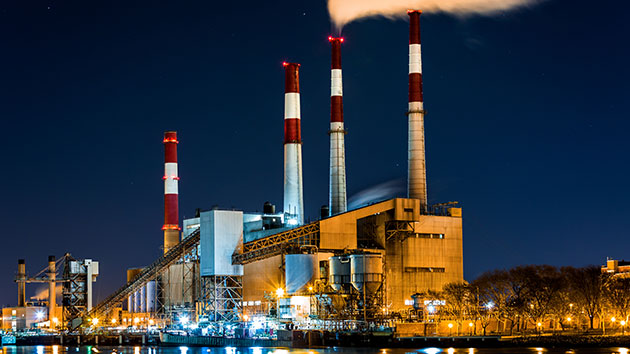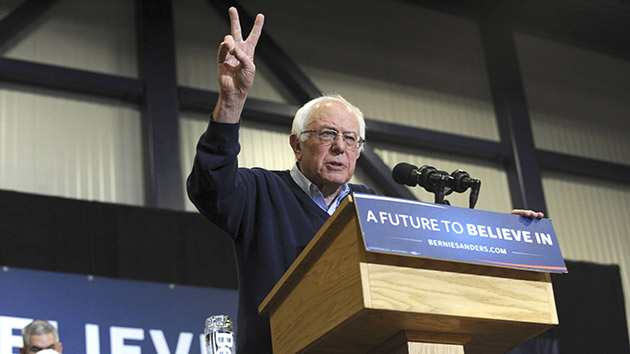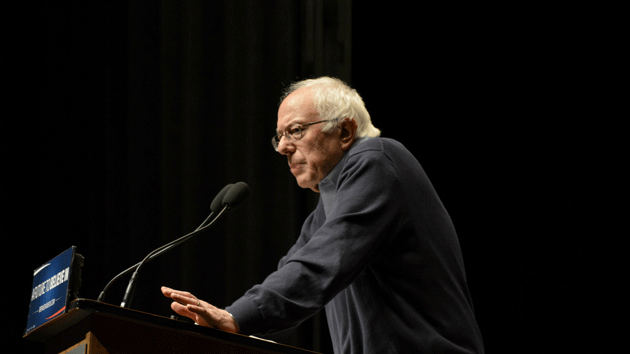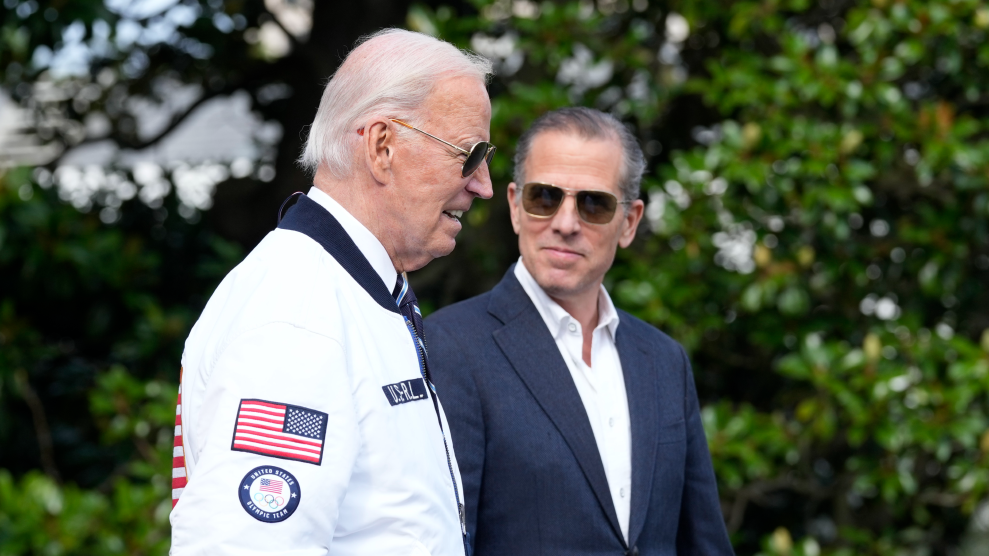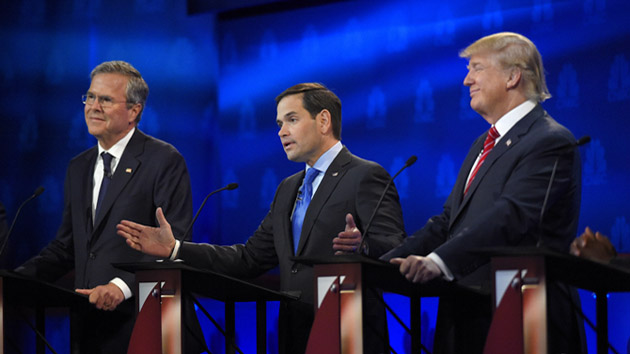
Mark J. Terrill/AP
The presidential debates so far have tended more toward theater of the absurd than substantive policy issues, especially on the crowded Republican stage. But whatever you make of the candidates’ discussion of other issues, it’s clear that climate change has barely surfaced. An analysis by Media Matters of the first eight primary debates found that as of mid-January, a grand total of nine (!) questions about climate had been asked. That’s about one-tenth the number of questions posed on “non-substantive” issues, which the group defines as “the political horserace, campaign gaffes, and other topics that are not related to any policy issue”:
During last weekend’s Republican debate, ABC’s moderators didn’t ask any questions about global warming. But they still found time to ask the candidates for their Super Bowl predictions. The lack of climate questions has been disappointing for many environmentalists and scientists, who were hoping for a clearer view of how the different candidates would (or wouldn’t) confront global warming.
Hillary Clinton and Bernie Sanders both accept the mainstream scientific consensus on climate change but have different ideas for dealing with it. Clinton wants to strengthen tax breaks for solar energy, for example, while Sanders has pushed for a tax on carbon emissions. On the Republican side, the conversation has ranged from Ted Cruz and Donald Trump’s outright science denial and Jeb Bush’s skepticism to Marco Rubio’s insistence that there’s nothing the government could do about climate change even if it were real.
The moderators need to dig much deeper. The Pentagon has identified climate change as a major national security threat; cities and states are investing in clean energy and protection from extreme weather; and President Barack Obama will soon officially sign the global climate deal reached in Paris.
“It’s amazing when you think of the infrastructure and other changes we’re gonna see, that people are not asking hard questions about ‘what is your plan to address emissions, and prepare for the changes?'” says Vicki Arroyo, executive director of the Georgetown Climate Center.
Still, climate change is complicated! Asking good questions about it can be hard. So to help out the moderators, we asked a bunch of the biggest names in climate science and environmental activism (including Mark Ruffalo and Neil deGrasse Tyson!) to share their ideas for the questions candidates should face. You can read them below. (We’ve lightly edited some of the questions for length and clarity. We’ve also added a few links to them, so you can learn more about what they are referring to.) And when you’re done, you can let us know in the comments or on Twitter what you’d ask the candidates about climate change.
Bob Inglis, former congressman (R-S.C.), activist, RepublicEn
- For the Republicans: Can free enterprise solve climate change? It’s a much better question than “Do you believe?” or “Is is a fact?”
Katherine Hayhoe, climate scientist, Texas Tech University
- For everyone: DON’T ask “do you BELIEVE in climate change” as if it were some type of religion (and as if their belief affects its reality in any way!) DO ask “what are your solutions given that China is out-competing the US in the new clean energy economy?”
Kevin Trenberth, climate scientist, National Center for Atmospheric Research
- For everyone: Given that the US is responsible for more carbon dioxide in the atmosphere than any other nation, do you think the US should lead the international effort?
- For everyone: Even if we make tremendous efforts to stop or slow the rates of climate change, it appears inevitable that we will continue to experience new record-breaking and potentially devastating climate extremes, such as heat waves, wildfires, and heavy rains and snows: How should a “green fund” be set up and managed to help build resiliency and adapt to climate change?
- For everyone: Given that gasoline is so inexpensive now, why not implement an immediate gas tax? Or should it be phased in?
- For everyone: What is your approach to removing subsidies and incentives for fossil fuels and implementing a carbon tax to change the framework that the private sector operates in?
Michael Mann, climate scientist, Penn State University
- For Republicans: Do you accept the scientific consensus that climate change is real, human-caused, and poses a threat to society?
- For Republicans: Do you support market-driven approaches to dealing with climate change, similar to the mechanisms that were employed by both the George H.W. Bush and Reagan administrations in combating other global environmental threats such as acid rain and ozone depletion?
Mark Ruffalo, actor and activist
- For everyone: With a dozen peer-reviewed studies showing the transition to 100 percent clean, renewable energy (sourced by the wind, water, and sun) is technologically possible, what would you do to help our cities, towns, states, and country make this transition as quickly as possible so every American has access to affordable clean energy over the next 30 years?
- For Republicans: Given the estimated cost of global warming worldwide as $17-25 trillion per year by 2050 due to coastal flooding and erosion, water supply loss, agriculture loss, enhanced severe storminess, enhanced human heat stress and heat stroke, enhanced air pollution due to higher temperatures, and enhanced disease, is there a reason you would not try to solve this problem if a low-cost, job-producing solution were available?
Ben Santer, climate scientist, Lawrence Livermore National Laboratory
- For Cruz: You’ve stated that climate scientists are involved in a vast liberal conspiracy to alter world systems of government and control the lives of ordinary Americans. Do you really believe that?
- For Cruz: You’ve argued that satellite estimates of atmospheric temperature show no significant warming over the last 18 years, and that satellites data tells us everything we need to know about the reality and causes of climate change. Did you know that your sources of information—like professor John Christy at the University of Alabama—have a history of making serious scientific errors in constructing satellite temperature estimates?
- For Bush: You’ve claimed that climate scientists are “arrogant” for making statements about the causes of climate change—despite the fact that scientists have been studying human and natural causes of climate change for well over 30 years. Doesn’t the real arrogance lie in ignoring the basic science, and ignoring scientific findings (such as those from the US National Academy of Sciences) that human activities are affecting global climate?
- For Rubio: Your home state of Florida is already being profoundly affected by sea level rise, and will continue to experience significant sea level rise in the 21st century. The best scientific understanding indicates that the warming caused by burning of fossil fuels is contributing significantly to sea level rise. Don’t you have a responsibility to the citizens of your home state to treat this problem seriously, and to do everything in your power to understand what the science is telling us?
- For Trump: You’ve tweeted that severe winter weather undercuts the scientific evidence for human-caused global warming. You’ve [also] tweeted that global warming is part of a Chinese plot to undermine US economic competitiveness. Do you really believe that?
- For Carson: You claimed publicly that there’s little scientific evidence for human-caused global warming. In response to this claim, [California] Governor Jerry Brown sent you a thumb drive containing the latest report of the Intergovernmental Panel on Climate Change. Did you read that report? If so, have you modified your views on the reality of human-caused climate change?
Michele Betsill, political scientist, Colorado State University
- Personally I would stay away from asking about whether they believe in the science or not. Too easy on both sides and allows them to sidestep the harder questions about what to do about it.
- For everyone: What is your view of the recent Paris agreement and what role do you think the US should play in the global response to climate change? If they respond that they think it is a bad policy for America/the economy and that they would try to pull the US out, ask how they would justify this position to the rest of the world, especially those countries most vulnerable to the impacts of climate change.
- For everyone: Most of America’s major cities have accepted that climate change is a legitimate concern and have developed and implemented policies, taking on a leadership role in the absence of action in Washington, DC. How would you explain this and what, if anything, should the federal government do to support these efforts?
Michael Shellenberger, activist, Environmental Progress
- For everyone: Climate scientists including James Hansen and a growing number of prominent environmentalists now say we need nuclear energy, not just solar and wind, to deal with global warming. Would you support including nuclear in a federal clean energy standard and otherwise equal the playing field for solar, wind, and nuclear?
Bill McKibben, activist, 350.org
- For the Republicans: As early as 2001, George W. Bush said the planet was warming dangerously, “in large part due to human activity,” and called on the US to put forth a “100% effort” to reduce greenhouse gases. Given that we’ve had 14 of the 15 hottest years ever recorded since he said that, why do you remain so dubious about climate science and climate action?
- For Clinton: You set up a special program in the State Department to promote fracking around the world. Given what we now know about the effects of methane on climate change—that many scientists think natural gas turns out to be worse than coal—do you stand by those earlier efforts, or do you think the time has come to try and restrict fracking?
- For Sanders: You’ve been outspoken in your opposition to fossil fuels, but how do we dramatically accelerate the spread of renewables in time? What specific changes must be made to the tax code and to the federal research agenda to spur the spread of renewables?
Jason Box, climate scientist, Geological Survey of Denmark and Greenland
- For Republicans: [Democrats] are making a lot of the issue of climate change. Yet, many in your party reject the mainstream science that humans are responsible for some four-fifths of the observed climate change. Would you seek to unify the GOP to address climate change in a way that may appeal better to US conservatives than how [Democrats] frame the issue?
Robert Stavins, environmental economist, Harvard University
- For Republicans: What’s your opinion of the Paris Agreement on climate change? Follow-up: Will you pull the US out of the agreement? Second follow-up: Would you be willing to jeopardize our relationships with China, Europe, and virtually every other country in the world on other matters ranging from trade to security, for the sake of this?
- For Democrats: If President Obama’s Clean Power Plan is invalidated by the courts, which many neutral observers think it may be, what will you put in its place?
Marc Levy, political scientist, Columbia University
- For Republicans: You have all expressed opposition to policies aimed at preventing climate change, and you have also all positioned yourselves as being able to do a better job than the Democrats at protecting US national security. Yet US military and intelligence leaders have said they worry a great deal about climate change as a multiplier that undermines US security, and these alarms have been consistent across Republican and Democratic administrations. How can you say you are serious about national security when you won’t even listen when our military says climate change is a major problem?
- For Democrats: You are both in favor of more vigorous policies to prevent climate change, and both are in agreement with the White House characterization of climate as a top priority that requires aggressive action. Economists are in almost complete agreement that the most effective policy measure would be a tax on carbon. Yet ever since George H.W. Bush first considered such a tax, every president has been either afraid to propose it or has failed to achieve it. How willing are you to go the mat to get a serious carbon tax instated, and what would you do differently than your predecessors in order to succeed?
- For everyone: In 2014 a bipartisan study of climate change, spearheaded by Tom Steyer, Hank Paulson, and Mike Bloomberg, concluded that climate change threatens to kill large numbers of Americans and imperil America’s economy through damage to its food, energy, and water systems. [Do you] accept the proposition that these risks require action; [if so,] what specific measures, if any, do you support?
Jeffrey Sachs, economist, Columbia University
- For everyone: Do you support the globally agreed target of keeping warming well below 2 degrees C (3.6 degrees F)? Do you have a long-term vision for how to de-carbonize the energy system? Would you honor the Paris climate agreement (signed also by all other 192 countries in the UN)?
Naomi Oreskes, science historian, Harvard University
- For Republicans: How would you deal with members of your own party who are still in denial on this issue?
- For everyone: China is moving ahead rapidly in the domain of renewable energy. What steps would you take to ensure that the US maintains technological leadership in this, and other, areas?
Francesco Femia, defense policy expert, Center for Climate & Security
- For everyone: The US military and intelligence communities have considered climate change a security threat, or “threat multiplier,” for decades, across both Republican and Democratic Administrations. Indeed, the Department of Defense has identified climate change as posing “immediate risks to national security,” which suggests that this is not just a long-term problem. Given this assessment by our military and intelligence communities, which is not at all driven by politics, what are YOU prepared to do on climate change that is commensurate to the threat?
Michael Burger, environmental lawyer, Columbia University
- For Democrats: There is a gap between the emissions reduction pledge the Obama administration has made as part of the Paris climate agreement and the emissions reductions the US is projected to achieve through existing rules and programs. There is also no easy way for the US to increase its mitigation ambition in the future, as everyone recognizes will be necessary to avoid the worst consequences of climate change. Understanding that congressional action is unlikely, what is your plan for filling the emissions gap, and how would you establish an effective mechanism for further reducing emissions in the future?
- For Democrats: The extraction and export of coal, oil, and gas from public lands represents an unfortunate escape hatch for the US, allowing segments of the US economy to continue to profit from fossil fuels even while the US ignores the emissions associated with the eventual, overseas combustion of those fuels. The Obama administration is taking a look at the coal leasing program, which may be a first step in correcting this gross inconsistency in the nation’s climate policy. Do you believe the US should refrain from extracting any further fossil fuels from public lands?
- For Republicans: Do you still, in the face of the overwhelming scientific consensus and the constant stream of evidence, question whether greenhouse gas emissions from human activities contribute to climate change? Do you also question other basic science—like evolution—or is it really just this?
Finally, a slightly different take from NDT:
Neil deGrasse Tyson, astrophysicist, American Museum of Natural History
- I don’t yet have questions for the candidates. All my questions are for the electorate. Top of the list: Knowing that innovations in science and technology stoke the engines of the 21st-century economy, how much weight will you give to a candidate’s policies on science and technology?
This post has been updated.

